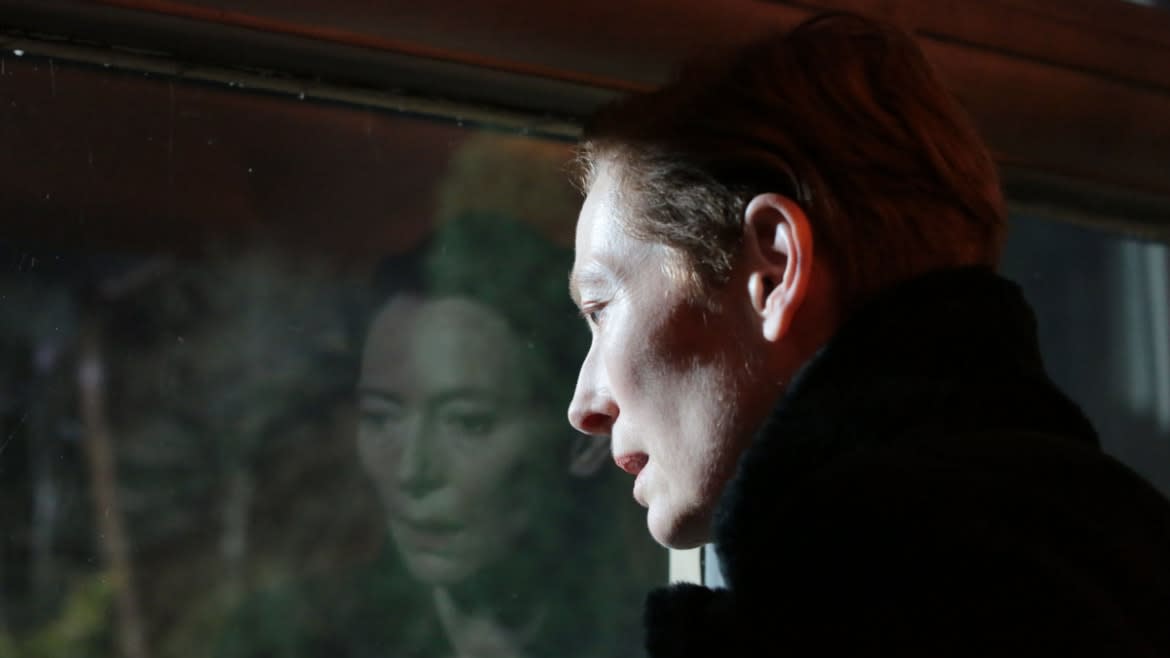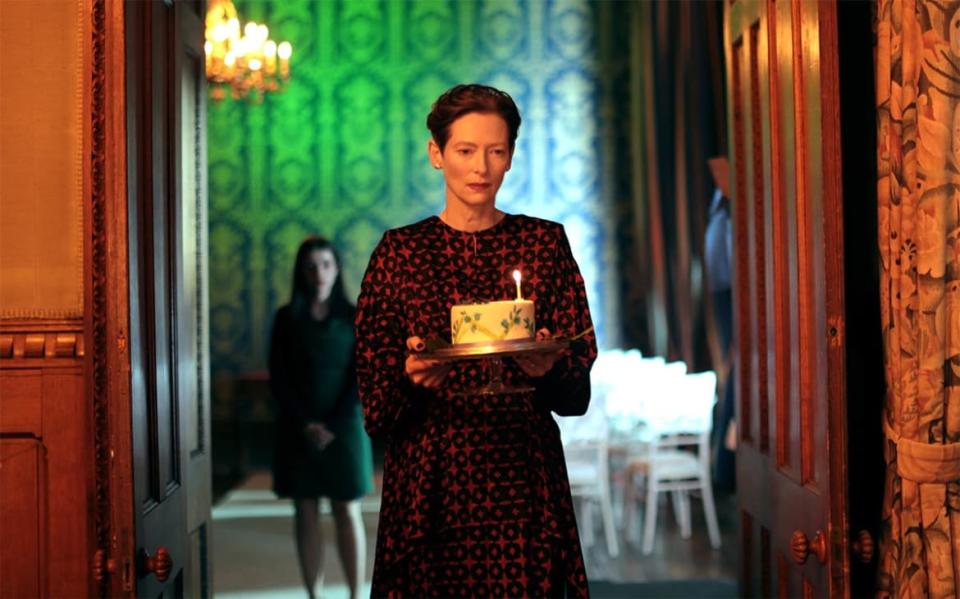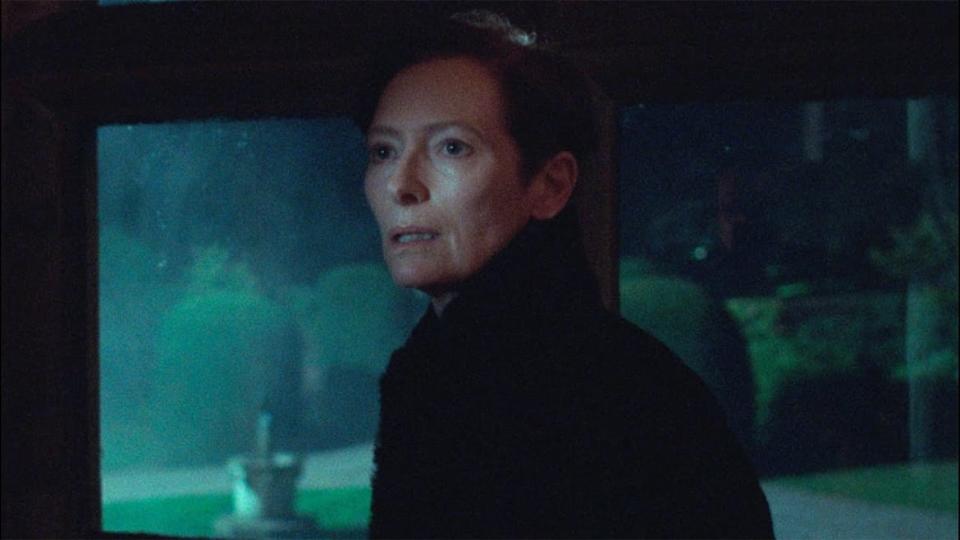Two Tilda Swintons Will Haunt You Forever in This Stunning Ghost Story

- Oops!Something went wrong.Please try again later.
- Oops!Something went wrong.Please try again later.
- Oops!Something went wrong.Please try again later.
- Oops!Something went wrong.Please try again later.
Director Joanna Hogg and Tilda Swinton may only be on their third feature film collaboration, but they’re deep into their fifth decade of friendship. Perhaps that’s what makes their newest partnership, The Eternal Daughter, so emotionally resonant—their enduring connection that spans not only life’s great milestones but its minutiae as well.
“It’s true that we’ve known each other for a very long time,” Swinton told the audience when the film screened recently at the New York Film Festival. “I’ve not only known Joanna, but I’ve also known her mother since I was a child, and we’ve been talking about our relationships with our mothers for 50 years. All of that talk and all of those wonderings have only got us so far. We still have to involve fantasy.”
That fantasy now comes in the form of a chilling British ghost story, The Eternal Daughter, slated for a potential December release from A24, the distributor that has become known (somewhat to its detriment) for bringing smaller-scale, avant-garde horror to the big screen. Whether one would call The Eternal Daughter a proper horror film is at the viewer’s discretion; it certainly doesn’t share many of the elements that we’re used to seeing in a piece of modern horror cinema. But like the most effective entries in the genre, it’s a film that settles itself in the bones for days after, lingering and mutating like a memory.

Memory, and all of the tricks it plays on us, is the subject at hand in The Eternal Daughter. The film tells of Julie, a skilled filmmaker, who brings her mother Rosalind to the Moel Famau hotel in the Welsh countryside for a birthday trip. The hotel used to be a family estate, and Julie hopes that their getaway will be both a pleasant source of nostalgia for her mother—who has long spoken of the happy times she had on the grounds as a child—and inspiration for a film that she longs to write about their relationship. From the moment their taxi driver tells them of ghosts he’s seen in the windows of the hotel on winter nights, Julie is spellbound. Ghosts are exactly what she hopes to confront at the Moel Famau, be they literal or just specters of Rosalind’s past.
Swinton plays both Julie and Rosalind, donning a gray wig and a smattering of old-age makeup for the latter. This is not the first time Swinton has played multiple characters of different ages—in even the last five years alone—but this is undeniably a potent pair of roles, given Swinton’s history with her director. First collaborating on Hogg’s 1987 short film Caprice, the two have since gone on to work together in 2019’s The Souvenir and 2021’s The Souvenir: Part II. Like The Eternal Daughter, The Souvenir saga was a work of meta-fiction dissecting Hogg’s life. In those films, Julie—a version of Hogg—was played by Swinton’s daughter, Honor Swinton Byrne, with Swinton playing the role of Rosalind.
Though both installments of The Souvenir powerfully mined Hogg’s relationship with her mother, Rosalind was but an ancillary character in Julie’s story of mid-twenties self-discovery. The Eternal Daughter thrusts the two into the present-day, examining the ways that their connection differs now that Julie’s older and how it stays the same.
Tilda Swinton’s Daughter, Honor Swinton Byrne, Is Hollywood’s Next Big Thing
The Eternal Daughter may be a pseudo-continuation of the story in The Souvenir parts one and two, adding to the texture of Hogg and Swinton’s previously woven tapestry. But the film also stands alone perfectly well, as its own haunting tale.
When Julie and Rosalind arrive at the Moel Famau, they’re greeted not only by the hotel’s ancient, creaking wooden staircases and eerie shadows, but also by an equally perplexing receptionist (Carly-Sophia Davies). Curt and self-important, she gives them a cold welcome and ushers them to their room—not the one Julie reserved months prior and called to confirm the week before, but another drafty selection. Julie can’t seem to figure out why her original reservation was given away when she and her mother seem to be the only ones staying at the hotel, but Rosalind doesn’t mind. Each room in the estate holds a muddle of memory; Rosalind draws them forth with glances at wallpaper and protracted gazing into space, remembering old furniture layouts and scattershot glimpses of a childhood more fraught than Julie realized.
Despite her mother making her life stories readily available for adaptation, Julie can’t seem to get settled into her work. A banging from an open window in an upstairs room during the night doesn’t help, nor do her unsettling late-night walks and the glow of green light that appears to follow her through the barren hotel. Julie may be burdened by her inability to start writing, but Rosalind takes comfort in the rituals of their days together in the hotel. Unlike Julie, her joy doesn’t stem from their conversations. Rosalind enjoys just being with her daughter.

Swinton’s turn as both mother and daughter never feels like a gimmick but rather a necessity. There are few manipulated two-shot scenes in the film. Instead, Hogg and cinematographer Ed Rutherford opt for filming each woman alone in their respective frames, connected in their mutual insularity. Swinton embodies both of her characters so naturally that the novelty of one person playing both Julie and Rosalind slips out the window in seconds. Like all of us and our mothers, there are indications of sameness—little suggestions that help us to remember that our experiences are connected—but we remain fundamentally different.
It’s within those differences, and our pursuit of connection despite them, that Hogg taps The Eternal Daughter’s poignant well of empathy. Her greatest skill as both a writer and a filmmaker is her ability to depict life’s inherent frailty. Her work exudes an unending amount of compassion, using clouds of ideas instead of proper scripts to excavate the improvisational nature of our own existence. While The Eternal Daughter may be a deeply personal story for both Hogg and Swinton, their artistic pairing will prove piquant for everyone—or “all children of parents,” as Swinton so aptly put it during her and Hogg’s Q&A.
In one scene in The Souvenir: Part II, Julie accidentally breaks an ornate sugar jar that Rosalind has made in a pottery class, a recent hobby that she’s taken up and is exceedingly proud of. As most mothers would, Rosalind comforts Julie and tells her it was simply a mistake; she chooses to move forward with a strong upper lip, despite her obvious heartbreak. Julie, unable to accept her mother’s reassurance in the overwhelming face of the bigger picture—the idea of her mother’s pride existing in this one piece of ceramic art—can’t stop herself from sobbing. Rosalind sits with an affected smile next to her daughter, as she talks to her husband instead.
The Best Performances From This Year’s Toronto International Film Festival
The Eternal Daughter crafts a parallel to this scene, more heart-rending now that the two characters are even further into their lives. On Rosalind’s birthday in the hotel restaurant, Julie is frustrated that the trip hasn’t been going as planned, and she can’t help but begin to cry when her mother fusses about not being hungry. Every memory, both painful and pleasant, comes rushing to the forefront of Julie’s consciousness as she’s confronted by the state of their relationship. More than that, she’s also haunted by the ghosts of her mother’s past and their mutual mortality.
At once, Julie sees the past aligned with both the present and the future. Despite their best efforts to communicate, a mother and daughter’s long-standing barriers can’t always be broken. Memories are like ghosts, haunting us by watching all the time; they’re not necessarily malevolent, just omnipresent. Drifting through one plane of consciousness to the next, forgotten until tales of the past are called upon once more. As with most scenes in the film, it’s somehow both droll and extremely moving—just like life.
Rosalind and Julie’s complicated but loving relationship expands and contracts like the fog on the moors of Moel Famau. It’s as mercurial as the weather, shifting seamlessly into its next stage, but informed by the changing pressure of what came before it. The peculiar beauty of both the film and the pair lies in its unpredictability, and though we can lament our inability to change these dynamics all we want, we cherish them regardless.
Julie’s desire to probe the wreckage of her mother’s past is unwittingly an invitation to unearth a wealth of hidden spirits in their present. In that respect—along with its sparse but macabre score and perturbing sound design—this is a classic ghost story. But The Eternal Daughter is even rarer than that: It’s a study of the inconsistencies between memory and reality, and the ultimate irrelevance of their intersection. Joanna Hogg and Tilda Swinton have concocted a stunning portrait of the paranormal ties that bind families, the ones that seem to unravel the more we tend to them. As fragile as they are, all they require is a flicker of memory to repair.
Get the Daily Beast's biggest scoops and scandals delivered right to your inbox. Sign up now.
Stay informed and gain unlimited access to the Daily Beast's unmatched reporting. Subscribe now.

